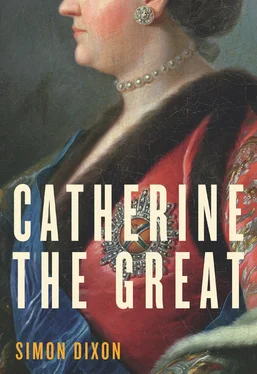In fact, Catherine kept up her duties at Court, attending both the theatre and the chapel in place of the fading empress. She and Peter hosted the Sunday reception days, sometimes together, sometimes separately. Looking back on their customary winter week at Oranienbaum in mid-January, Dashkova contrasted the ‘wit, good taste and decorum’ that prevailed in Catherine’s part of the palace with the cruder entertainments that Peter enjoyed with his Holsteiners at camp or in the Grüne Salle (Green Room), whose walls were draped with pine and fir branches. 14There, in the company of dancers and singers from his opera troupe, he liked to set off table fireworks in the form of intricately decorated desserts, ‘not without inconvenience from the smoke and sulphurous vapours’, as Jacob Stählin remarked. 15A less combative picture of the visit emerges from the account by the Piedmontese Misere. Downstairs, a military band played while the men smoked their pipes. The weather stayed fine until after midnight, but after lunch on the following day, undeterred by snow and wind, Peter and his guests—Count Hendrikov and his wife, the Shafirov family and Prince Dashkov—set out for Catherine’s dacha in twelve small sledges. There was ‘much pleasure and a lot of laughter’ as they tumbled in the snow. The grand duchess herself served Italian liqueurs ‘in her beautiful round house at the top of the hill’, as they all ‘drank coffee and milk from the farm, with black bread and butter’. 16
By the end of January, Chappe was ready to depart for Siberia, but the Court now found even more entertaining company in the shape of another visitor, King Irakly of Georgia. In a letter to her daughter, Countess Vorontsova listed his gifts with a practised eye for size and value:
Our Gracious Sovereign was presented with a very pure agate, weighing two zolotniks or more, twenty-three strings of large oriental pearls, and two Persian silver brocades. His Highness [Peter]—a dagger with diamonds and agates; Her Highness [Catherine]—a small mirror with precious stones and two strings of large pearls; and His Highness P[aul] P[etrovich]—a dagger. And he gave Mikhail Larionovich [Vorontsov] a very good dagger, which Shah-Nadir himself had worn, some gilded silver tackle for the horses, and a hookah-pipe with precious stones for smoking tobacco that Pauzié said was worth 2000 roubles. And he gave me a big diamond ring, a string of large pearls and a 15-string pearl bracelet (as big as yours), handmade from Persian silver. 17
Elizabeth felt sufficiently recovered to appear before her Court on Easter Saturday. ‘We were all delighted to see [her] in the great chapel,’ reported her relieved lady-in-waiting, ‘and everyone was pleased that she permitted them to kiss her hand.’ Another important ‘first’ was achieved when Paul made his debut on the dance floor. ‘He is a very handsome child,’ reported the dutiful Sir Robert Keith, ‘and dances wonderfully well for one of his age.’ 18The Court was glad to see the little boy dance with his mother at the coronation day ceremony. By then, Catherine’s birthday banquet celebrations had been followed by an opera on 23 April, which the Georgian king much enjoyed. Pleased to have found an exotic potentate to patronise, Vorontsova told her daughter that it was ‘impossible to believe how well he behaves!’ 19
On 11 May, Peter and Catherine travelled to Oranienbaum for what was probably their longest single spell of uninterrupted residence. Although they returned to Peterhof for Peter’s name day celebrations at the end of June—and both Catherine and Peter subsequently made separate trips to see their son (in her case for not much more than an hour)—they were to remain ‘in the country’ until they moved back to the Winter Palace on 9 September. 20Perhaps it was during this period of relative leisure that Catherine jotted down (or at any rate added to) a series of miscellaneous notes that give a sense of her developing political ideas and ambitions (though they cannot be dated precisely, the notes were made between February 1758 and February 1762, and the final one quotes a French periodical of March 1761). 21Peace and prosperity were two obvious aims for an empire engaged in an exhausting European war. ‘All I hope, all that I wish is that this country in which God has cast me should prosper. God is my witness to that. The glory of this country is my glory.’ ‘Peace is necessary to this vast empire; we need population, not devastation; we need to populate our great empty spaces as much as possible.’ A passage in Bielfeld’s Cameralist Political Instruction prompted her to reflect on the benefits of enlightened toleration: ‘To do nothing without principle or without reason, not to allow one to be led by prejudice, to respect religion, but not to give it any power in State matters, to banish everything that reeks of fanaticism and to draw the best out of every situation for the public good, is the basis of the Chinese Empire, the most durable of all those known on this earth.’ A strong sense of justice emerges, prompted by the treatment meted out to Bestuzhev: ‘All my life I will remain hostile to the idea of establishing a secret Committee of Inquiry to judge a guilty man. An open trial, the judgement of the Senate, as in France and England, where a peer is tried by his peers, is the only solution.’ There was also a strong note of idealism: ‘It is against justice and the Christian religion to make slaves out of men, born to be free.’ 22
By the summer of 1761, Catherine was pregnant again, this time by a new lover, Grigory Orlov, the virile guards officer who was to remain by her side until 1773. Wounded at the battle of Zorndorf, Grigory had returned from the war with a reputation for valour. We do not know when their affair began, but here was a type who would subsequently attract her again and again. Though he could boast none of Poniatowski’s intellectual accomplishments, Grigory seemed willing to learn (he too was interested in astronomy) and keen to listen to her ideas. As her political ambitions developed, she may well have chosen him for his military connections—he and his four brothers, all gallant and popular officers, could support her in good times and bad. And the Orlovs were not the only people Catherine had begun to cultivate. Nikita Panin, a protégé of Bestuzhev who had survived his master’s disgrace and remained on terms with the Vorontsovs during his twelve years as ambassador to Sweden, had returned to St Petersburg in 1760 to take charge of her son’s education and allowed her to see more of him than she had previously been able to do. Another occasional visitor to Oranienbaum was Princess Dashkova, a potential source of intelligence on the whole Vorontsov clan. 23
While Catherine kept out of sight in the country, an increasingly breathless Elizabeth was left to cope with the heat of the summer in St Petersburg. After lunch on 26 May, she drove out to watch the fire that blazed all day in Mesh-chanskaya Street. 24June brought the prospect of more pleasurable excursions, as she travelled first to Peter Shuvalov’s estate at Pargolovo and then to Peterhof, reliving the old days by dining in Aleksey Razumovsky’s rooms while hunting horns serenaded them outside. After another excursion a few days later, it was three in the morning before she returned from Monplaisir, the seaside pavilion at Peterhof. Such a regime was bound to alarm the medics. Dr Condoidi, Elizabeth’s Greek physician, himself died of apoplexy the previous August, being replaced by the Scot, James Mounsey, and Dr Schilling. Karl Kruse joined them in June 1761. ‘We are rich in doctors here,’ Countess Vorontsova told her daughter. 25
In mid-July ‘the Empress caused great anxiety to all her Court’ with ‘an attack of the hysterical vapours and convulsions which knocked her unconscious for several hours’. 26It was the beginning of the end. Now that Elizabeth’s horizons were shrinking, there was no great ceremony or banquet at the end of August for the knights of the Order of St Alexander Nevsky. Back in St Petersburg, she took her meals at a round table in a corner room of the Summer Palace, overlooking the Fontanka. She still found the energy for the occasional visit to Ivan Shuvalov, but was always back by 10 p.m. The banquet and ball, hosted by Peter and Catherine on Paul’s birthday, went ahead without her. After the Court’s return to the temporary Winter Palace two days later, the grand ducal couple hosted the Court receptions, too. Elizabeth celebrated with Catherine in the great chapel for the first time that autumn on 26 October to give thanks for the capture of Troppau by Field Marshal Buturlin. On 13 November, they both attended a French comedy. It proved to be the empress’s last appearance in public. Only the grand duchess and her son attended the ball on her name day. It was over by eleven. Though the following day, 25 November, was the empress’s accession day, the greatest day in the Court calendar, Elizabeth remained closeted in her apartments. Despite the customary 101-gun salute, the servants wore only standard livery. Banquet, music and fanfares were all cancelled on her birthday, 18 December, though there was a salute after the end of the morning liturgy attended on the empress’s behalf by Catherine alone. 27
Читать дальше












